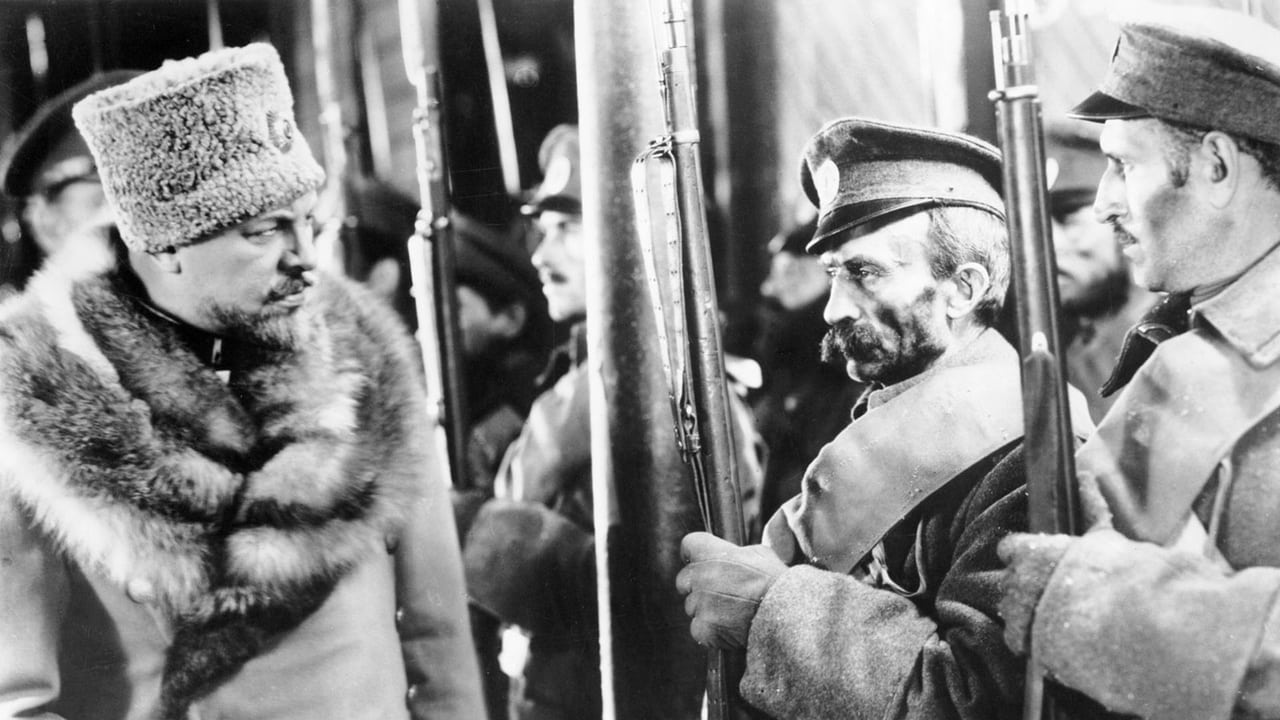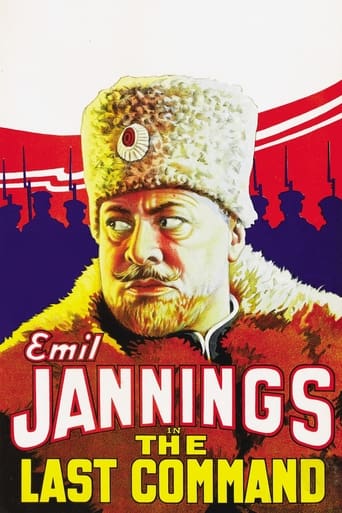

A bit overrated, but still an amazing film
... View MoreI really wanted to like this movie. I feel terribly cynical trashing it, and that's why I'm giving it a middling 5. Actually, I'm giving it a 5 because there were some superb performances.
... View MoreI have absolutely never seen anything like this movie before. You have to see this movie.
... View MoreThe thing I enjoyed most about the film is the fact that it doesn't shy away from being a super-sized-cliche;
... View MoreEmil Jannings (General Dolgorucki), Evelyn Brent (Natascha Dobrowa), William Powell (Leo Andreiev), Nicholas Soussanin (adjutant), Michael Visaroff (Serge, the valet), Jack Raymond (assistant director), Viacheslav Savitsky (private), Fritz Feld (revolutionist), Harry Semels (soldier), Alexander Ikonnikov, Nicholas Kobyliansky (drill- masters), Shep Houghton (Russian youth).Director: JOSEF VON STERNBERG. Screenplay: John F. Goodrich. Based on an original story by Lajos Biro and Josef von Sternberg (which was in turn based on a suggestion by Ernst Lubitsch). Titles: Herman J. Mankiewicz. Photography: Bert Glennon. Film editor: William Shea. Art director: Hans Dreier. Make-up: Fred C. Ryle. Technical adviser: Nicholas Kobyliansky. Production supervisor: J. G. Bachmann. Associate producer: B. P. Schulberg.Copyright 21 January 1928 by Paramount Famous Lasky Corp. Presented by Adolph Zukor and Jesse L. Lasky. New York opening at the Rialto, 22 January 1928. U.S. release: 21 January 1928. 9 reels. 8,154 feet. 90 minutes.SYNOPSIS: Former Russian general is reduced to working as an extra in Hollywood.NOTES: Academy Award, Best Actor, Emil Jannings (for this picture and The Way of All Flesh). Also nominated for Best Picture (Wings) and Original Story (Underworld).Number 3 in the Film Daily poll of U.S. film critics (after The Patriot and Sorrell and Son).COMMENT: One of the films that confirms Chaplin's observation that just as the Silent Cinema achieved maturity, it was thrown away. Von Sternberg's fluid direction is a joy to watch and his ironic story is concisely told with a minimum of sub-titles. Jannings deserved his Academy Award and is given excellent support, particularly by Brent and Visaroff.
... View MoreMonday February 6, 7pm The Paramount, Seattle "From now on you are my prisoner of war -" "- and my prisoner of love."As the Russian revolution runs wild, a General in the Czar's army, Sergius Alexander (Emil Jannings) escapes execution with the help of a beautiful spy. Years later, a former revolutionist turned Hollywood movie director (William Powell) recognizes a head shot of the general, now a decrepit old man working as an extra, and plans his revenge.Directed by Josef von Sternberg, The Last Command (1928) was the highlight of Jannings' brief Hollywood career. Combined with his performance in The Way of All Flesh (1927), The Last Command received the first Academy Award for best actor in a leading role. Screenwriter Lajos Biró was nominated for best original story. Evelyn Brent, previously featured in von Sternberg's Underworld (1927), stars as the lovely femme fatale Natalie in a complex, pivotal role.Inspired by the life of General Theodore Lodijensky, The Last Command features one extraordinary, unexpected shocker and a table-turning, earth-shaking finale.
... View MoreThis is one of the most richly woven tapestries I have discovered on film about film, acting about acting, fictions about fictions. The extra allure here is that it comes to us from the last minutes of the first hours of cinema, at the cusp of silent and sound filmmaking and so just as cinema - then pioneering elaborate theories about the eye animating the world, and so the eye as soul - was about to revert back to the simple machinations of theater. It would re-emerge from these notions in the time of the New Wave; this is New Wave of thirty years before.The story is so interesting in itself, you should know a rough outline; an exiled Russian general winds up - is karmically reborn - on a Hollywood set as a movie extra to play a Russian general, reliving the past. The framing story is a flashback to his days in Russia, the old Russia about to be torn asunder by revolution, and then we have contemporary time as he struggles to relive the events for the camera.The story within a story that emerges is connected by the most astonishing panorama of people acting roles. So we have within the flashback, which takes up most of the film; the general acting autocratic from the power of a uniform; troops acting in front of the Czar who inspects them; the revolutionary girl acting coy and in love; then while truly in love - this is a plot point you will just have to swallow - acting like a revolutionary; finally the general acting out his part in the cataclysmic turn of events.There is more, once we reach out of the film; so we have a European actor coming to America to act in a film about the same, the only surviving film from his time in America; acting again a part he had played in The Last Laugh some years before. As in Murnau's film it is the uniform, and so the fabric of ceremonial occasion, there a hotel porter's uniform, that permits a performance that validates living. And once painfully stripped of it, there is only naked soul.This is all very potent stuff to see, but it wouldn't be the same without the powerful ending. The general assumes his position on set as himself, and as cameras roll out their re-enactment of a forlorn trench, he becomes completely submerged in the hallucination, memory, essentially the internal narrative running in his mind of the original events. So we have a third layer here, the set as the space of memory and now the eye, the camera, looking inwards to relive.The motion rippling across the layers is so seductive we may overlook how this ripple is a full cycle.The one narrative is finally complete in the others, the cycle only possible with this alignment, and so this poignantly reveals both the creative and destructive aspects of art. The various threads and boundaries blurred, are now clear again through an osmosis of the soul. On one side we have the act of a powerful creation; on the other, bitter end, a broken man consumed in the fire of that act.Sternberg knew what he was doing. Everything here dazzles with artifice, scale of descent, camera magic. The transition inside the flashback and back from it happens through a mirror, the looking glass of fictions that crystallizes illusion. This is the full cycle then; the ending somberly unmasks truth in illusion, heart in mind. See, if you can find it, from the same year The Life and Death of 9413, a Hollywood Extra, about an anonymous, disposable actor caught in the wheels of the dream factory. I will follow the thread to The Blue Angel.
... View MoreLast Command, The (1928) **** (out of 4) Marvelous drama about a former Russian General (Emil Jannings) who after the war fled the country and ended up in America where ten years later he's working as an extra in Hollywood. A director (William Powell) is making a movie about that Russian war when he comes across a picture of the former General and recognizes him as the man who threw him in prison years earlier. This here certainly turned out to be something truly special and a lot of the credit has to go to director von Sternberg but we also have Jannings turning in a magnificent performance, which ended up winning him an Oscar. The story also won a Oscar and it's easy to see why because the screenplay pretty much contains ever bit of emotion you could possibly want. There's some nice laughs, a pretty good love story, some political drama and some incredibly tense scenes. What shocked me so much is that it seems like von Sternberg wanted the first twenty-minutes or so to gain sympathy for our main character as we see him obviously destroyed by life and working for peanuts as an extra. When then get the grand flashback to when he was pretty much the ruler of Russia and how his encounter with a woman (Evelyn Brent) pretty much changes the rest of his life. The story is part tragedy but it also works incredibly well as a character study because one can't help but love this guy and feel sorry for the pain he goes through. The "Rosebud" from CITIZEN KANE is perhaps the greatest secret in film history but I think Jannings' nervous head shake has to be the second one. Early on we're told that this head shake is due to some accident and when it's finally revealed what that accident was it comes as a great shock and is an incredibly powerful sequence. The final thirty-minutes of the movie is like an out of control train, which is funny because the majority of the footage takes place on-board a train. As the revolution begins the film starts to pick up energy and drama and it just keeps growing and growing as the thing moves along. It's clear von Sternberg planned it this way because he just keeps pounding the viewer with one twist after another and the suspense just keeps building until that final secret is revealed. The aftermath as the story picks back up in Hollywood is yet another powerful turn and will certainly leave an impact on the viewers. Jannings is marvelous in the main role as he really is playing two characters and he does a terrific job with both of them. I was very moved by his performance as the broken down extra because he tells us everything we need to know the first time we see his face. The eyes can be a very powerful thing for an actor and Jannings tells us so much with the look on his face. The power and emotion in his eyes isn't something they can teach at an acting school and the veteran certainly knows how to use his. Powell's role isn't nearly as flashy but he too is quite good. Brent is even more impressive here than she was in the director's previous film UNDERWORLD. Her character goes through a lot of changes as well and I thought the actress nailed each one of the emotions and manages to have us want to see her dead one second only to then change our opinions on her a split second later. THE LAST COMMAND is certainly one of the most powerful movies from this era with a final thirty-minutes that rank among the best I've ever seen.
... View More